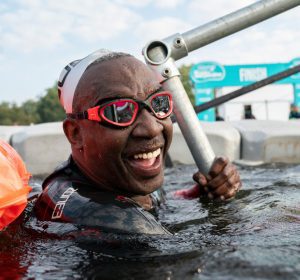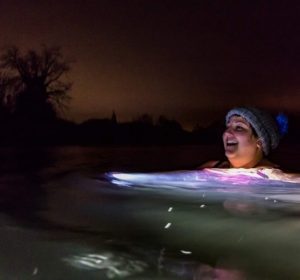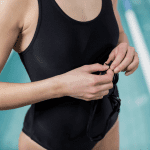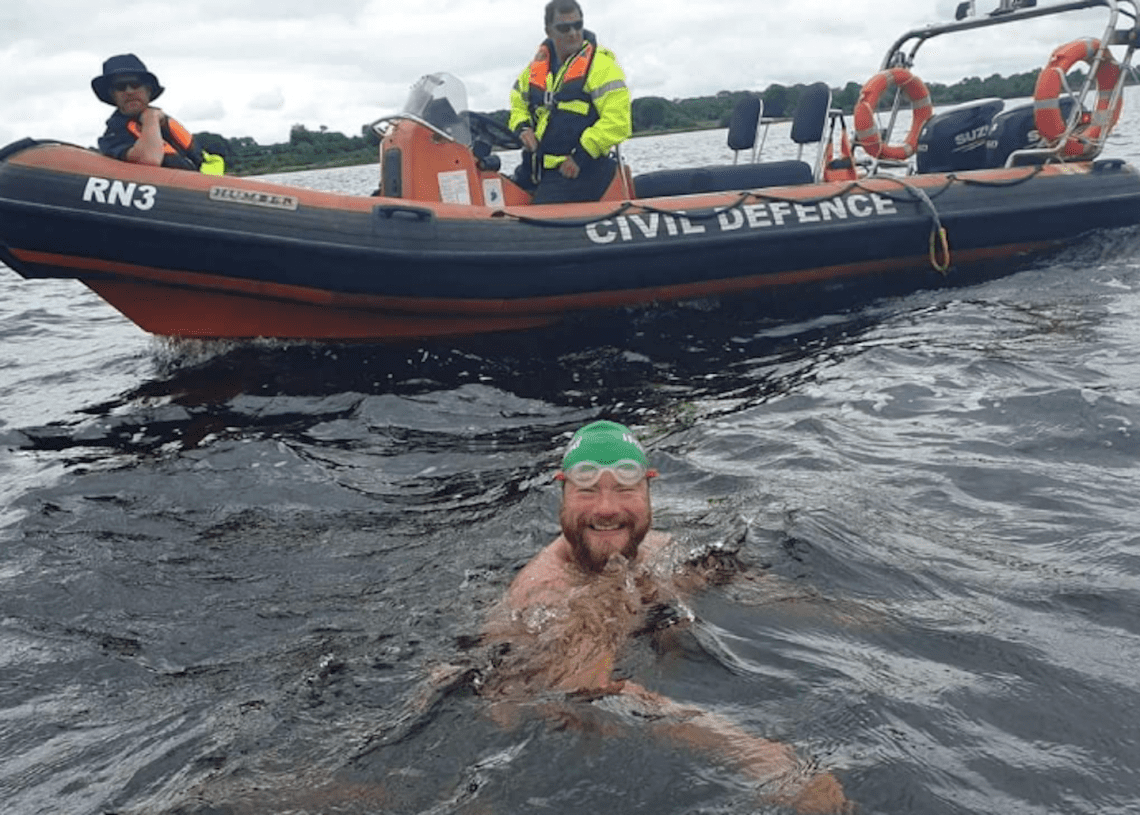
A swim against suicide
Irish swimmer Ger Moore has swum the length of the River Shannon (250km) to raise awareness and funds for suicide prevention charities Jigsaw and Pieta House
On 18 June 2023, charity swimmer Ger Moore embarked on his 250km swim of the length of the River Shannon, starting at the top of Lough Allen then ending in Limerick City on 1 July.
Ger swam an average of 17km per day for 14 days. This averaged at around 9 hours of swimming per day; however one of the days took him 12 hours due to challenging conditions.
With the challenge under his belt and having raised over €8,000 for his chosen charities, Jigsaw and Pieta House, Ger spoke to us about his River Shannon swim and how he trained for it.
Ger, congratulations on completing your River Shannon swim. Can you tell us a bit about your background as a swimmer?
I’m a 48 year old skins swimmer, more of the slow and steady variety than a speedster. Due to a lack of local outdoor swimming groups, myself and friend Colm Daly set up the Lough Ree Orcas swim group in 2018 in order to encourage others to safely enjoy swimming in the open water. The Lough Ree Orcas currently has over 180 swimmers, both skins and wetsuits swimmers. A large number of us swim all year round while others prefer to stick with the slightly less cooler times of the year!
Tell us more about the River Shannon and its navigability.
The River Shannon is navigable for about 250km from the top of Lough Allen to where it meets the Shannon Estuary in Limerick City, and has three large lakes that it flows through.
To complete the swim, I needed to swim an average of 17km per day for 14 days continuously. This took an average of 9 hours swimming, and over 12 hours on one of the days day due to challenging swimming conditions.
How did you fare during your swim?
This challenge was completely out of my comfort zone as each of my previous long-distance skins swims were one-day swims, with proper rest prior and sufficient recovery afterwards. But I was delighted to finish the swim on schedule as my biggest fear as the challenge progressed was of not being able to finish the swim due to picking up an injury.
What were the conditions like for your swim?
Conditions were varied. I had strong winds for most of the swim, which was uncomfortable in the sheltered stretches of the river and nearly hostile in the open parts of the lakes. I was supported by a lake boat in the sheltered parts of the swim in the first week. Then I had support from RIBs and volunteers from many local groups for the remainder of the swim.
I was also supported by family members and friends from the Lough Ree Orcas who assisted in all aspects of the swim. This swim wouldn’t have been possible without these volunteers who gave their time and expertise generously and without complaint. I can’t express my thanks to each and every one of them enough.
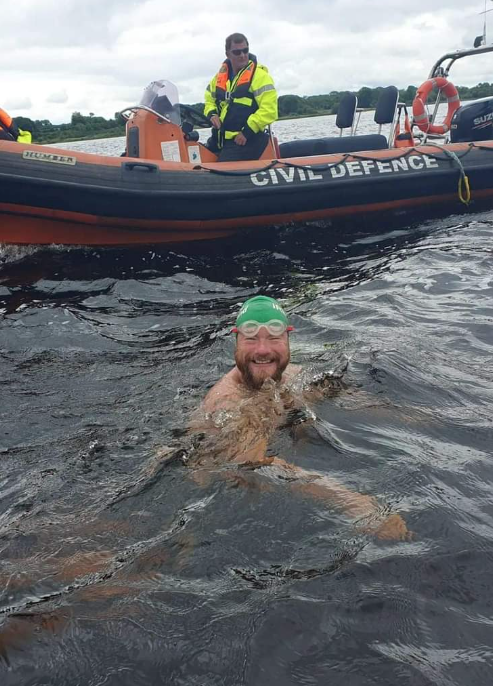
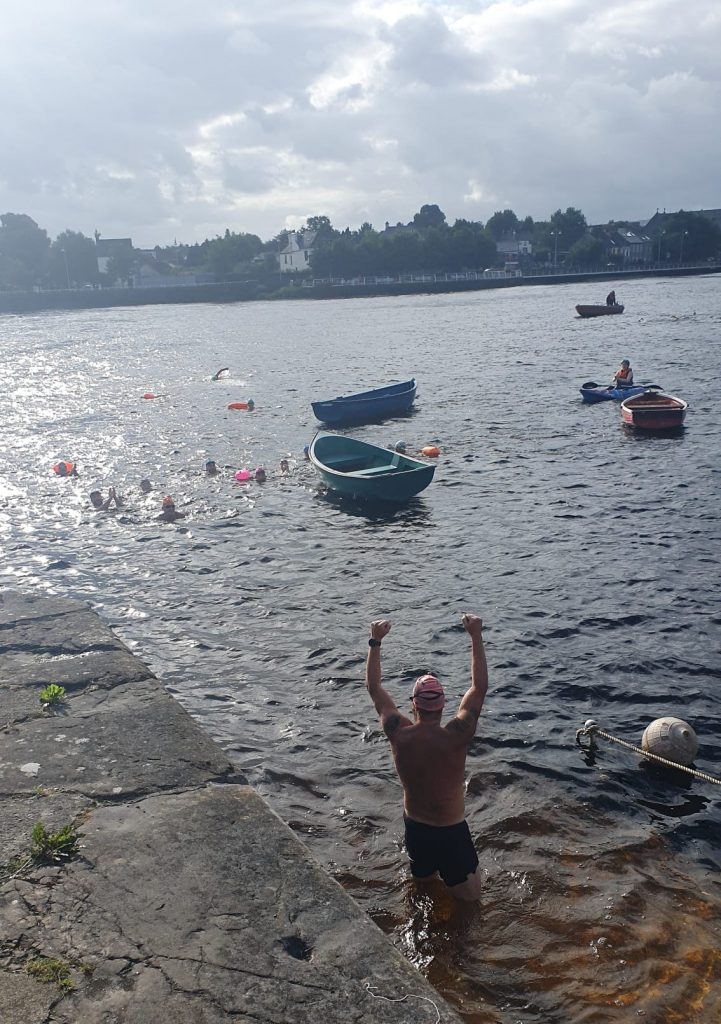
Was there a favourite moment for you?
Definitely swimming into Limerick with family and supporters at the finish point. I was joined for the last 3kms by local swimmers from the Limerick Narwhals, and even a crowd of swimmers from my own group, the Lough Ree Orcas. They’d travelled 250km down from Roscommon to Limerick in big numbers.
How did you train for your swim?
I trained for over the past year or so by swimming in the pool with our local swim club Comans Masters SC, with Lanesboro Triathlon Club, and in the open water with the Lough Ree Orcas.
A typical day would commence in the pool at 6am, a session in the open water after work, then either gym or run training in the evenings. I tried to rest one day a week to avoid injury and give the body time to repair and recover.
What were you eating during your swim?
For nutrition, I had fruit, water and an electrolytes and fuel drink. This was all topped up generously with snacks such as soft-baked protein bars, chocolate and jellies!
Please tell us more about the charities you’re fundraising for.
I undertook this challenge for two Irish suicide prevention charities Pieta and Jigsaw as I feel there isn’t any community in the country that has’t been affected by someone dealing with mental health issues and/or suicide.
Pieta provides free counselling to those with suicidal ideation, those engaging in self-harm, and those bereaved by suicide. Jigsaw is a community of professionals, supporters, and volunteers with a shared belief in an Ireland where every young person’s mental health is valued and supported.
What advice would you share to others considering doing a multi-staged long-distance swim like yours?
Get as fit as you can prior to the swim. Surround yourself with the best support you can get, and don’t be afraid to adapt your plans as you’ll be confronted with things beyond your control.
Ger’s fundraiser for Jigsaw and Pieta is still open for donations: idonate.ie






